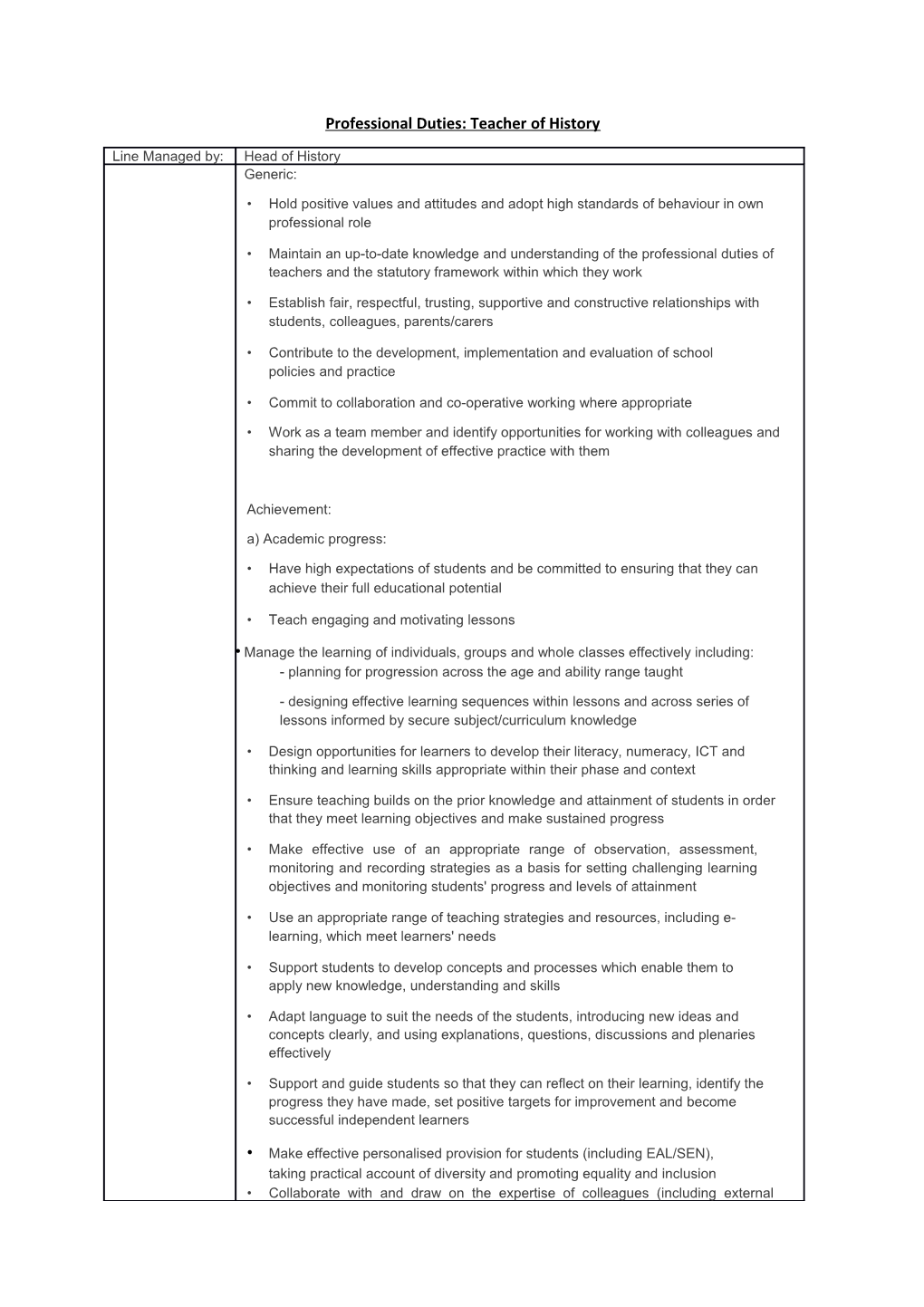Professional Duties: Teacher of History
Line Managed by: / Head of HistoryGeneric:
•Hold positive values and attitudes and adopt high standards of behaviour in own professional role
•Maintain an up-to-date knowledge and understanding of the professional duties of teachers and the statutory framework within which they work
•Establish fair, respectful, trusting, supportive and constructive relationships with students, colleagues, parents/carers
•Contribute to the development,implementation and evaluation of school policies and practice
•Commit to collaboration and co-operative working where appropriate
•Work as a team member and identify opportunities for working with colleagues and sharing the development of effective practice with them
Achievement:
a) Academic progress:
•Have high expectations of students and be committed to ensuring that they can achieve their full educational potential
•Teach engagingand motivating lessons
•Manage the learning of individuals, groups and whole classes effectively including:
- planning for progression across the age and ability range taught
- designing effective learning sequences within lessons and across series of lessons informed by secure subject/curriculum knowledge
•Design opportunities for learners to develop their literacy,numeracy,ICT and thinking and learning skills appropriate within their phase and context
•Ensure teaching builds on the prior knowledge and attainment of students in order that they meet learning objectives and make sustained progress
•Make effective use of an appropriate range of observation, assessment, monitoring and recording strategies as a basis for setting challenging learning objectives and monitoring students' progress and levels of attainment
•Use an appropriate range of teaching strategies and resources,including e-learning, which meet learners' needs
•Support students to develop concepts and processes which enable them to apply new knowledge,understanding and skills
•Adapt language to suit the needs of the students, introducing new ideas and concepts clearly, and using explanations, questions, discussions and plenaries effectively
•Support and guide students so that they can reflect on their learning,identify the progress they have made, set positive targets for improvement and become successful independent learners
•Make effective personalised provision for students (including EAL/SEN), taking practical account of diversity and promoting equality and inclusion
•Collaborate with and draw on the expertise of colleagues (including external agencies)with specific responsibilities for students with additional learning needs to support them to fulfil their potential
•Identify and support students whose progress, development or well-being is affected by changes or difficulties in their personal circumstances, referring them to colleagues for specialist support when appropriate
•Identify and use opportunities to personalise and extend learning through out-of-school contexts where possible making links between in-school learning and learning in out-ofschool contexts
•Provide students, colleagues, parents/carers with timely, accurate and constructive feedback on learners' attainment, progress and areas for development
•Encourage parents/carers to participate in discussions about the progress and development of students
•Review the effectiveness of own teaching and its impact on student progress, attainment and well-being, refining approaches where necessary
•Use local and national statistical information about student progress to inform self-evaluation
•Commit to improving own practice through appropriate professionaldevelopment
•Act upon advice and feedback and be open to coaching and mentoring
b) Attendance and Punctuality:
•Ensure the curriculum and teaching and learning within your lessons is engaging and encourages student attendance
•Support the HoD to monitor student attendance and punctuality to your lessons and refer concerns to relevant Head of Year (inc. Head of Sixth Form)
•Reward and celebrate good/improving attendance and punctuality via tutor time, assemblies, phone-calls/letters home, stamps, certificates, celebration events, and reward trips
SMSC:
•Reward and celebrate acts of good citizenship/contributions to the school/local community via tutor time; assemblies, phone-calls/letters home, stamps, certificates, celebration events and reward trips
Behaviour and Safety:
•Implement the current legal requirements, national and school policies and guidance on the safeguarding and promotion of the well-being of children and young people
•Establish a purposeful and safe learning environment within your classroom which complies with current legal requirements,national policies and guidance on the safeguarding and well being of students so that they feel secure and sufficiently confident to make an active contribution to learning and to the school
•Recognise and respect the contributions that colleagues, parents/carers can make to the development and well-being of students
•Have a good, up-to-date working knowledge and understanding of a range of behaviour management and inclusive teaching strategies and employ them effectively and according to the school Inclusion policy
•Promote learners' self-control, independence and cooperation through developing their social, emotional and behavioural skills
•Implement the school Positive Discipline Policy.
•Monitor the behaviour of students in your lessons and tutor group
•Identify students whose behaviour is a cause for concern in your lessons and tutor group
•Liaise with teachers and HoD re. intervention strategies (see Inclusion policy) to implement within your lessons and tutor group
•Reward and celebrate good/improving behaviour via phone-calls/letters home, stamps, certificates, celebration events and reward trips
•Liaise with parents/carers of the students you teach, school staff, external agencies to promote excellent behaviour and remove barriers to learning
•Support the HoD to ensure the department learning environment and teaching and learning complies with Health and Safety Policy
•Implement the Anti-Bullying policy
•Liaise with teachers, students,Pastoral Managers and Heads of Year to provide prompt and effective intervention to respond to bullying incidents
•Work with the pastoral team to implement the school's Uniform and Equipment policies
Other duties agreed with Line Manager as may be reasonably required, commensurate with the character of the post and level of responsibility
